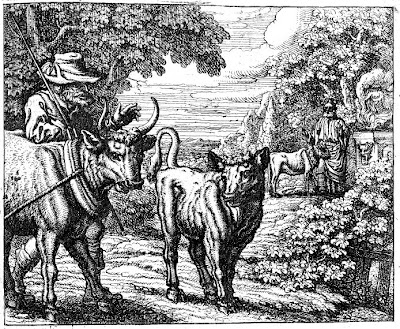LATIN CHRISTMAS CAROLS: Yes, it is the time for Latin Christmas carols again! I've re-opened the Christmas Carol blog for the month of December, with a holiday song in Latin for every day of the month, December 1 through December 31 - you can see them all now at Gaudium Mundo: Latin Christmas Carols. You can use the Javascript to include the Christmas carol of the day automatically each day on your webpage or blog, too, if you want.
Latin Proverb of the Day: Today's proverb is Lucrum cum iactura famae damnum est, non lucrum (English: Profit, with the loss of reputation, is loss, not profit - a good saying for the folks of Wall Street to keep in mind!). You can use the Javascript to include the Latin proverb of the day automatically each day on your webpage or blog. Meanwhile, to read a brief essay about this proverb, visit the AudioLatinProverbs.com website.
Greek Proverb of the Day: Today's proverb is Ἰχθὺς ἐκ τὰς κεφαλῆς ὄζειν ἄρχεται (English: The fish starts to smell from the head - metaphorically, it means that corruption starts "at the top," with the leaders of a society, not with the average citizen!). You can use the Javascript to include the Greek proverb of the day automatically each day on your webpage or blog - and each Greek proverb also comes with a Latin version.
Fable of the Day: Today's fable of the day from Barlow's Aesop is DE PARTU MONTIUM (the story of the mountains who gave birth to a mouse). You can use the Javascript to include the fable of the day automatically each day on your webpage or blog - meanwhile, to find out more about today's fable, visit the Ning Resource Page, where you will find links to the text, commentary, as well as a discussion board for questions and comments.
Latin Via Fables: Grammar Commentary: I'm presenting the "Barlow Aesop" collection, fable by fable, with my commentary on each (a more expanded commentary than is possible within the confines of the book). Today's grammar commentary is Fable 36: Equus et Asellus Onustus, the story of the horse who refused to help the donkey - and of the painful lesson he learned as a result! Here is Barlow's illustration for the story:

The Aesopus Ning is now open for business - so for more fables and to share your questions and comments with others, come visit the Ning!





















